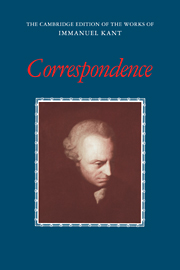Book contents
- Frontmatter
- Contents
- General Editors' Preface
- Acknowledgments
- Introduction
- Letters before 1770
- Letters 1770–1780
- Letters 1781–1789
- 1781
- 1782
- 1783
- 1784
- 1785
- 1786
- 1787
- 1788
- 1789
- Letters 1790–1794
- Letters 1795–1800
- Public Declaration concerning Fichte's Wissenschaftslehre, August 7, 1799
- Biographical Sketches
- Glossary
- Index of Persons
1787
from Letters 1781–1789
Published online by Cambridge University Press: 07 September 2010
- Frontmatter
- Contents
- General Editors' Preface
- Acknowledgments
- Introduction
- Letters before 1770
- Letters 1770–1780
- Letters 1781–1789
- 1781
- 1782
- 1783
- 1784
- 1785
- 1786
- 1787
- 1788
- 1789
- Letters 1790–1794
- Letters 1795–1800
- Public Declaration concerning Fichte's Wissenschaftslehre, August 7, 1799
- Biographical Sketches
- Glossary
- Index of Persons
Summary
I hope that a copy of the second edition of my Critique will have been conveyed to you, dear friend, by Herr Grunert of Halle; if not, the enclosed letter to him, which I beg you to post, should take care of it.
If you think it necessary to arrange for a review of this second edition, I would be very grateful if it took note of an error in transcription that troubles me. Something like this:
“In the Preface, p. xi, the third line from the bottom contains a copying error, since “equilateral” is written instead of “equiangular” triangle. (Euclid's Elements, Bk. I, Prop. 5.)”
For even though in Diogenes Laertes' version one can easily see that the latter is intended, not every reader has a copy of Diogenes readily available.
My publisher commissioned a Latin translation of the second edition of my Critique, by Professor Born in Leipzig. You were kind enough to offer to inspect his completed translation if it is sent to you a section at a time, to make sure that the style, which might aim too much at elegance, be more or less Scholastic if not quite Old Latin in its precision and correctness. If your kind offer is still valid, please let me know what my publisher will owe you for your trouble. From me you will have the greatest gratitude. I have sought to inform Prof. Born of this plan in my enclosed letter.
- Type
- Chapter
- Information
- Correspondence , pp. 261 - 273Publisher: Cambridge University PressPrint publication year: 1999
- 1
- Cited by

